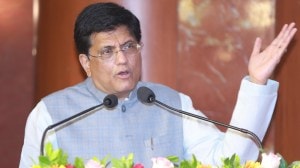Paved with good intentions
In his Budget speech for 2000-01, the finance minister announced the biggest programme for rural development this nation has seen: Rs. 250...

In his Budget speech for 2000-01, the finance minister announced the biggest programme for rural development this nation has seen: Rs. 2500 crore, earmarked from the diesel cess, for improving rural connectivity. It is now 10 months since the scheme was announced. Virtually not a paisa has been spent 8212; and there are only two months left for the fiscal year to end. Instead of building rural roads, the government has spent the last 300 days just preparing guidelines on how to spend the money. This mountainous labour has produced a document of eight 8212; yes, exactly eight 8212; pages!
Brevity being the soul of wit, one would in the normal course have been grateful for so short a document, but it is a perusal of the guidelines that really makes one8217;s blood run cold. Venkaiah Naidu8217;s ministry for rural development is charged, above all other tasks, with implementing Part IX of the Constitution relating to Panchayati Raj. The eleventh schedule specifies rural roads as one of the key responsibilities of the panchayati raj institutions. Indeed, classically, the division of responsibilities between the three tiers of the panchayati raj system is illustrated by saying district roads are the responsibility of the district panchayats; other district roads of the intermediate panchayats; and village link roads of the gram panchayats. Yet, notwithstanding this clear constitutional directive, which is the entire raison d8217;etre for Naidu8217;s ministerial remit, the only reference to the panchayats is in paragraph 7.1 where the minister orders the panchayats to be responsible for the 8220;maintenance8221; ofroads they have had no role in identifying or constructing. The entire programme is conceived for the bureaucrats by the technocrats for the greater glory of Venkaiah Naidu. The people for whom the programme is conceived hardly get a peek in.
The Constitution specifies that the prime responsibility of the panchayats is the 8220;planning and implementation8221; of programmes relating to the economic and social development of rural India. It is precisely because the bureaucratic delivery of development has been the biggest disaster of independent India that Parliament enacted this, the longest and most detailed amendment. Yet, Naidu8217;s guidelines para 3.2 says 8220;the programme will be planned, co-ordinated and implemented8221; through the executing agencies identified and so designated by the 8220;State Government/ UT Administration8221;. Monitoring will be by a state-level standing committee 8220;ideally headed by the chief secretary8221; 8212; since when has this been the ideal8217; arrangement? At the centre, an empowered committee, chaired ideally? by the secretary, rural development, and comprising six other babus will bless or damn Rs-2500 crore worth of proposals every year! The best the panchayats can hope for is that 8220;suitable linkages8221; will be established 8220;inthis behalf with the district rural development agencies DRDAs8221;. DRDAs are an anachronism from the pre-constitution amendment of a distant past. They are institutions designed to be dominated by the collector/district magistrate and his army of bureaucrats and technocrats. Only the most muscle-bound of the local politicians gets a look-in. The ordinary panch or sarpanch is nowhere to be found in DRDA meetings. Worst of all, Venkaiah Naidu8217;s eight pages of guidelines entirely exclude from the planning and implementation of this the most significant exercise ever in rural development the district planning committees, elected by and from amongst the members of the panchayats and nagarpalikas, which is a constitutional obligation under Part IX A of the Constitution. Naidu deserves to be impeached for this breach of constitutional propriety. Except that the poor fellow is probably still trying to read and understand the babu-speak of the guidelines for which he is nominally responsible: it is his officers whohave taken him for this ride.
Paragraph 3.4 of the guidelines specifies that it is the project implementing unit which will 8220;formulate a master plan for each block8221;. The master plan will, of course, go to the governing body of the DRDA, dominated by MPs and MLAs but from which is excluded for all practical purposes the poor villagers, or their grassroots representatives, for whom the master plan is allegedly designed. Contempt for the ordinary people is for Venkaiah Naidu the preferred way. In my childish naivete, I did not for a moment think that eight years after Parliament enacted the constitution amendments, Naidu would be so negligent of his constitutional responsibilities. Immediately after the Budget announcement, therefore, I toured as many panchayats of my constituency as I could informing people of this wonderful new scheme. I arranged for lakhs of handbills to be printed and circulated through my party workers to virtually every household in the constituency. I also had prepared a compendium of all the rural roads asked forduring my regular rural tours.
By July last year, I had submitted to the collector, the state government and the union government in both Tamil and English lists of the hundreds of roads, with a rough estimate of length and breadth that the people themselves desired. The entire exercise has been a colossal waste of time. The collector and his staff, with the patronage doubtless of the state government powers-that-be, has decided of his own sweet will which roads are to be built, which prioritised, of what length, what breadth and what quality. Three of the nine blocks of my constituency have been left out altogether and the others are to be graced with some two to three kilometres of road length each 8212; that8217;s it. By sheer coincidence, at least one of these roads is one of the highest priorities urged on me by my constituents. For which small mercy may the Lord be praised!
I said a while earlier that Venkaiah Naidu8217;s minions had spent 10 whole months manufacturing these tedious guidelines. They have done one more thing: divide the loot between different states. Unsurprisingly, the two biggest beneficiary states are those of Venkaiah Naidu and Yashwant Sinha. They will protest that their states are among the least developed. So, it is the condition of their states, not the incidental fact of their being the ministers in charge, which accounts for the bonanza. But it is because they themselves know that the allocations they have made will not stand up to public scrutiny that they ensured the repeated postponement of meetings of the parliamentary standing committee which might have asked some awkward questions. Fortunately, democracy has a way of over-turning fascist decision-making. The standing committee8217;s report will be before Parliament this Budget session. Then the can of worms will be well and truly opened.
The entire programme is conceived for the bureaucrats by the technocrats for the greater glory of Naidu. The people for whom it is conceived hardly get a peek.
- 01
- 02
- 03
- 04
- 05































